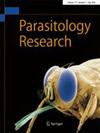亚洲 Paragonimus 物种(Paragonimidae: Platyhelminthes)的核核糖体转录单位:遗传特征、多态性及对上层种间系统发育的影响。
摘要
获得并鉴定了五种亚洲副姬蛙核糖体转录单位(rTU*)的整个转录序列(从18S rRNA基因的5'端到28S rRNA基因的3'端)。P.heterotremus(越南 LC 株)的 rTU* 长度为 7661 bp,P. iloktsuenensis(日本 Amami 株)的 rTU* 长度为 7422 bp,P. skrjabini miyazakii(日本 OkuST1 株)的 rTU* 长度为 6932 bp,P. ohirai(日本 Kino 株)的 rTU* 长度为 7422 bp。esternmani的三个菌株:8616 bp(Megha菌株,印度)、7292 bp(Bogil菌株,韩国)和7052 bp(QT2菌株,越南)没有基因间间隔区(IGS)。研究描述了所有七个亚洲副鳞片虫品系的遗传特征,包括单个基因/区域的长度、重复多态性、碱基组成和偏度。为了研究 Xiphidiata 的超家系关系,重点是 Troglotrematoidea 及其相关超家系,我们使用 PhyML 软件包创建了三个全面的最大似然系统发生。所使用的数据集分别是来自Xiphidiata亚目、Echinostomata亚目和Haplosplanchnata亚目同一物种的整个rTU和/或可获得的核糖体序列的83个28S+18S序列、83个单一完整18S序列和157个单一、部分28S rDNA序列,并以一个血吸虫序列作为外群。三棵系统发生树显示棘皮动物亚门(Echinostomata)和Haplosplanchnata是单系的,而Xiphidiata是多系的,包含单系的Troglotrematoidea。18S + 28S 和单 18S 系统进化分析表明,有 7 个超科(Troglotrematoidea、Haploporoidea、Gorgoderoidea、Brachycladioidea、Microphalloidea、Plagiorchioidea 和 Opecoeloidea)得到了良好的支系支持,这些超科在 Xiphidiata 中是单系的。Haploporoidea 是与 Gorgoderoidea 和 Troglotrematoidea 邻近嵌套的基干超科,没有被支持为一个独立的 Haploporata 亚目。在部分 28S 系统发育中,七个虹彩纲超科中有六个是单系的,只有 Opecoeloidea 除外,它被分成两个不同的亚支系:Opecoelidae和Stenakridae/Zdzitowieckitrematidae。单系的 Haploporoidea/Haploporata 从 Gorgoderoidea 的同系中分离出来,归入 Xiphidiata 的边缘群。Paragonimidae中有两个值得注意的群组:混合群(mixed-Paragonimus),其中包括一个相当紧凑的P. heterotremus品系群;P. westmani/siamensis,分为地理/国家品系群。总之,核糖体 rDNA 组合序列比单一 rDNA 标记更能有效地解析家族间和家族性关系。本文所介绍的核糖体数据集将有助于对蛙形目和其他虹彩纲和吸虫纲超科进行分类学重新评估、进化和种群遗传学研究。The entire transcribed sequences (from the 5' terminus of 18S to the 3' terminus of 28S rRNA genes) of the ribosomal transcription units (rTU*) of five Asian Paragonimus species were obtained and characterized. The rTU* length was 7661 bp for P. heterotremus (LC strain, Vietnam), 7422 bp for P. iloktsuenensis (Amami strain, Japan), 6932 bp for P. skrjabini miyazakii (OkuST1 strain, Japan), 7422 bp for P. ohirai (Kino strain, Japan), and three strains of P. westermani: 8616 bp (Megha strain, India), 7292 bp (Bogil strain, South Korea), and 7052 bp (QT2 strain, Vietnam) without intergenic spacer region (IGS). All seven Asian Paragonimus strains' genetic characteristics were described, including the length of individual genes/regions, repeat polymorphism, base composition, and skewness. To investigate the superfamilial relationships in the Xiphidiata, with a focus on the Troglotrematoidea and its associated superfamilies, we used the PhyML software package to create three comprehensive maximum-likelihood phylogenies. The datasets used were 83 concatenated 28S + 18S, 83 single complete 18S, and 157 single, partial 28S rDNA sequences, respectively, from entire rTUs and/or accessible ribosomal sequences of the same species from the suborders Xiphidiata, Echinostomata, and Haplosplanchnata, with a Schistosoma sequence as an outgroup. Three phylogenetic trees revealed that Echinostomata and Haplosplanchnata are monophyletic, while Xiphidiata is polyphyletic and contains the monophyletic Troglotrematoidea. The concatenated 18S + 28S and single 18S phylogenies revealed well-bootstrap supported seven superfamilies (Troglotrematoidea, Haploporoidea, Gorgoderoidea, Brachycladioidea, Microphalloidea, Plagiorchioidea, and Opecoeloidea) that are monophyletic in the Xiphidiata. The Haploporoidea was a basal superfamily nested close to the Gorgoderoidea and Troglotrematoidea and was not supported as a distinct suborder Haploporata. Six of seven xiphidiatan superfamilies were monophyletic in the partial 28S phylogeny, with the exception of Opecoeloidea, which was separated into two different subclades: Opecoelidae and Stenakridae/Zdzitowieckitrematidae. The monophyletic Haploporoidea/Haploporata was separated from the Gorgoderoidea associates and placed in a marginal group in Xiphidiata. There were two notable clusters in the Paragonimidae: mixed-Paragonimus, which included a fairly compact group of P. heterotremus strains, and P. westermani/siamensis, which was divided into geographical/country strain groups. In conclusion, combined ribosomal rDNA sequences were more effective than single rDNA markers in resolving interfamilial and familial relationships. The ribosomal datasets presented here will be useful for taxonomic reassessment, as well as evolutionary and population genetics research in the Troglotrematoidea and other superfamilies in the Xiphidiata and the class Trematoda.

 求助内容:
求助内容: 应助结果提醒方式:
应助结果提醒方式:


